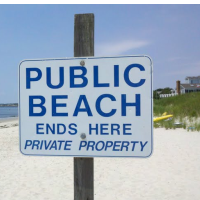Lawmakers Give Coastal Commission the Power to Levy Fines over Beach Access

When Assemblywoman Toni Atkins of San Diego introduced AB 976 last year, she didn’t have the clout to pull enough of her fellow Democrats aboard to give the California Coastal Commission additional authority to fine wayward property owners.
But Atkins is now the newly-elected Speaker of the Assembly and she was able to guide remnants of the legislation into a budget trailer bill, signed last week by Governor Jerry Brown.
The 38-year-old law that created the Coastal Commission empowered it to sue violators of California’s coastal laws, an expensive proposition that forces the agency to choose who it pursues carefully. That will still be the case for those who allegedly build without proper permits and damage wetlands, but the commission will have an additional weapon to take on those who illegally deny people public access to beaches.
The independent Legislative Analyst’s Office noted in 2008 that the commission rarely pursues its cases in court for practical reasons and recommended it be allowed to assess fines and penalties, which would help stabilize its funding base and make it more effective. The Sacramento Bee said 20 other agencies have the authority.
Although the commission is considered the bane of many seaside property owners—like Malibu residents who block beach access and companies that illegally dump debris—it is limited by a small staff of 135, who are responsible for 1,100 miles of coastline. Its inflation-adjusted budget is half what it was in 1980 when it had a staff of 212, according to the San Jose Mercury News.
Around 29% of the commission’s backlog of enforcement cases involve blocked access to public beaches, 27% have to do with illegal road grading and building, 24% address unpermited development in wetlands and sensitive habitats, and 24% concern the removal of coastal vegetation without a permit. Case specifics add up to more than 100% because some cases involve multiple violations. Other violations include: water pollution (13%) and diking, filling and dredging (8%).
The most visible case involving beach access these days does not yet involve the Coastal Commission. The Surfrider Foundation is suing Silicon Valley venture capital billionaire Vinod Khosla for blocking the only access road to the once-public Martin’s Beach in Half Moon Bay after he bought a 53-acre coastal parcel.
Surfers, picnickers, fishing folk and other beachgoers had been welcomed at the popular spot owned by the Deeney family for more than 100 years. The Deeney’s provided a grocery store, public restrooms and cabins that they leased until 2008 when they sold to Khosla. He promptly put a gate on the road, posted security guards and threatened to pursue criminal prosecution of anyone who tried to sneak in.
The current case in San Mateo County Superior Court is the second one brought against Khosla. The first one failed when a judge said the 1848 Treaty of Guadalupe Hidalgo trumped the California Coastal Act. Superior Court Judge Gerald Buchwald ruled that the treaty, which settled the Mexican-American War, granted the 200-acre beach property to Jose Antonio Alviso before California’s Constitution in 1879 established the public trust doctrine that preserved access to such areas for all state residents.
One of the foundation’s arguments in the narrower lawsuit is that Khosla, co-founder of Sun Microsystems, violated the Coastal Act by not getting a proper permit to close the road. It remains to be seen if a billionaire is at all intimidated by the commission’s new power to levy fines.
But legislation passed by the state Senate and wending its way through the Assembly might get his attention. Senate Bill 968 directs the State Lands Commission (SLC) to begin negotiations with Khosla to reopen the road or face possible eminent domain proceedings that would acquire the public access.
A ruling from the court is expected sometime this summer.
–Ken Broder
To Learn More:
Budget Bill Gives Coastal Commission Power to Impose Fines (by Josh Richman, Bay Area Newsgroup)
It’s Privacy vs. the People in the Battle for Martin’s Beach (by Adam Nagourney, New York Times)
Legislature Cracks Open Gate at Martins Beach (by Jason Hoppin, Santa Cruz Sentinel News)
Judge Invokes 1848 Treaty to Block Public Access to Billionaire’s Beach (by Ken Broder, AllGov California)
Coastal Commission Denied Power to Enforce Its Rulings with Fines (by Ken Broder, AllGov California)
- Top Stories
- Controversies
- Where is the Money Going?
- California and the Nation
- Appointments and Resignations
- Unusual News
- Latest News
- California Forbids U.S. Immigration Agents from Pretending to be Police
- California Lawmakers Urged to Strip “Self-Dealing” Tax Board of Its Duties
- Big Oil’s Grip on California
- Santa Cruz Police See Homeland Security Betrayal in Use of Gang Roundup as Cover for Immigration Raid
- Oil Companies Face Deadline to Stop Polluting California Groundwater





